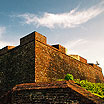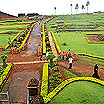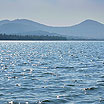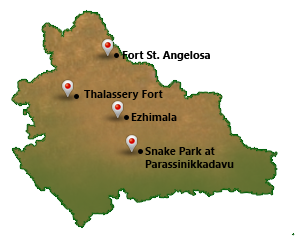Kannur District is one of the 14 districts of Kerala. The town of Kannur is the
district headquarters. Cannanore, old name of kannur is the anglicised form of the
Malayalam name Kannur. Kannur district shares its boundary with Kasaragod District
to the north, Kozhikode district to the south and Wayanad District to the south-east.
Kannur is of great strategic military importance. It houses one of the 62 military
cantonments in the country. The Ezhimala Naval Academy which is largest naval academy
in Asia and third largest in the World is situated in Kannur. The district is bounded
by the Western Ghats to its east, which forms the border with Karnataka State, in
its district of Kodagu and the Arabian Sea lies to its west. The district was established
in 1957.
The city was an important port on the Arabian Sea as it was a centre for carrying
on trade with Persia and Arabia in the twelfth and thirteenth centuries. It also
served as the British military headquarters on India's west coast until 1887. Kannur
was the capital city of the only Muslim Sultanate of Kerala, known as Arakkal. Arakkal
kettu or Arakkala Palce is now converted into a museum which has all the artefacts,
furnitures and warfare equipments which were used by the Arakkal dynasty.
TOURIST SPOTS IN KANNUR

Fort St. Angelos :-Fort St. Angelos is in the west of Kannur town is a massive triangular laterite fort, replete with a moat and flanking bastions. It was built in 1505 by the first Portuguese Viceroy, Don Francisco De Almeida, with...
Read More
Fort St. Angelos
Fort St. Angelos is in the west of Kannur town is a massive triangular laterite
fort, replete with a moat and flanking bastions. It was built in 1505 by the first
Portuguese Viceroy, Don Francisco De Almeida, with the permission of the Kolathiris.
It was then captured by the Dutch in 1663 before they sold it to Ali Raja of Kannur
in 1772 and in 1790 it came into the possession of the British. The British then
rebuilt it and it was their most important station in Malabar. This fort is in a
fairly good state of preservation, though parts of it have collapsed. The fort is
a protected monument under the Archaeological Survey of India. The fascinating view
of a natural fishing bay and a sea wall projecting from the fort separating the
rough sea and inland water makes it one of a kind.

Thalassery Fort :-In 1700, the British built the Thalassery Fort on a small hill called Tiruvellapadkunnu. The fort is a square structure built of laterite and is distinguished by its massive ventilated walls and strong flanking bastions.
Read More
Thalassery Fort
In 1700, the British built the Thalassery Fort on a small hill called Tiruvellapadkunnu.
The fort is a square structure built of laterite and is distinguished by its massive
ventilated walls and strong flanking bastions. It is said that a mixture of quicklime,
white of egg and sugar candy were used in the construction of the fort. It was here
that Raider captain was imprisoned. The famous St. John's Anglican Church is behind
this fort. Secret tunnels to the sea, beautifully craved doors and a beaming light
house are some of the peculiarities of the Fort. There are two underground chambers
in the light house that were believed to be used to store goods like pepper and
cardamom. It is said that the coins of the East India Company were minted here.

Ezhimala :-Ezhimala is an ancient historical site which is the capital of ancient Mooshika Kings. It was one of the major battlefields of the Chola-Chera war. Ezhimala was considered a flourishing sea port and a centre of trade in ancient Kerala.
Read More
Ezhimala
Ezhimala is an ancient historical site which is the capital of ancient Mooshika
Kings. It was one of the major battlefields of the Chola-Chera war. Ezhimala was
considered a flourishing sea port and a centre of trade in ancient Kerala. It is
believed that Lord Budha had visited Ezhimala. An old mosque, believed to contain
the mortal remains of Shaikh Abdul Latif, a Muslim reformist, is also located here.
Bordered by sea on three sides, Ezhimala occupies a prominent place in the naval
history of the country, as the Indian Naval Academy was set here in 2009.

Snake Park at Parassinikkadavu :-The Snake Park at Parassinikkadavu is situated 18 kms from Kannur town. It is one of the well- known snake parks in the country. The park is dedicated to the preservation and conservation...
Read More
Snake Park at Parassinikkadavu
The Snake Park at Parassinikkadavu is situated 18 kms from Kannur town. It is one
of the well- known snake parks in the country. The park is dedicated to the preservation
and conservation of snakes, most of which are becoming extinct gradually. There
is a large collection of poisonous and non-poisonous snakes such as the Spectacled
Cobra, King Cobra, Russell's viper, Krait and various pit vipers and Pythons. Live
show is conducted here which educates people against the superstitions about snakes
and also help to quell the mystical fears. The snake park is under the authority
of Visha chikitsa Kendra that offers effective treatment against the snake bite.
.png)






